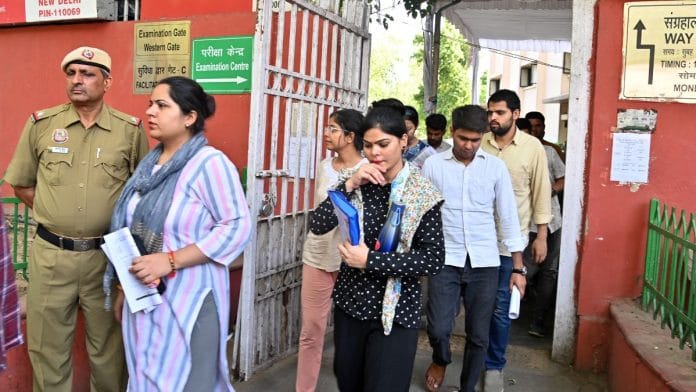New Delhi: Twenty-six-year-old Mahesh Singh prepared for two years to appear in the Union Public Service Commission examination. He gave his first attempt on 16 June, Sunday. He attempted 78 out of 100 questions in the two-hour General Studies paper. Singh is expecting to score 101 out of 200. It’s a score that will help him clear the preliminary, the first level of the exam.
However, Singh was shocked to learn that someone solved the entire exam in just seven minutes, with a score of 175. To his relief, that ‘someone’ isn’t human.
An Artificial Intelligence-based app PadhAI attempted 94 questions out of 100. Using answer keys provided by different coaching institutes—Vajiram, Vision IAS, Physics Wallah—for the UPSC preliminary exam 2024, the bot scored between 170 and 185 marks.
The app, developed by a group of IITians, took the Prelims at the same time as the aspirants, around 11:35 am, at The Lalit, New Delhi in the presence of education sector professionals, the UPSC community, and journalists. OpenAI’s ChatGPT scored only 75 marks in the same exam and didn’t clear the cutoff.
“We use UPSC-specific and news data to ensure the model is aligned with UPSC needs. Our AI is trained on different sources of current affairs and is updated dynamically. Hence, it can crack exams like UPSC, which has a high percentage of current affairs questions,” said Sidhant Kabra, a founding member of PadhAI and a graduate of IIT Bombay.
The app has been designed to help aspirants and provide them with a resource to prepare for UPSC.
“In the future, we will explore expanding this to other exams as well,” said Kabra.
The app offers many AI features, including news summaries, smart previous-year question paper search, NCERT book content, doubt clarification, and interactive answer explanations. All this plays a very important role in preparation.
Until now, students have mainly depended on the Rs 3,000 crore UPSC coaching industry.
PadhAI is the product of SigIQ.ai, founded in July 2023 by Karttikeya Mangalam. He holds a doctorate from the Berkeley AI Research lab. Over the last seven years of research at UC Berkeley, Stanford, Meta AI, Google AI, and IIT Kanpur, he has published over 35 papers that have been cited over 4,000 times.
“This is the highest score achieved in the last 10 years of UPSC exams. We believe that while our event is the first of its kind, in a few years, such events will become commonplace as several educational institutions race to solve papers quickly and precisely with AIs,” PadhAI’s CEO Mangalam said.
PadhAI’s team of developers includes UPSC aspirants who graduated from IITs.
Also read: Alakh Pandey of Physics Wallah has turned into messiah of NEET 2024 students overnight
No nuance in AI
The AI intervention may sound disruptive but coaching institute owners say that while it provides and processes information, it cannot apply and articulate knowledge.
“AI, operating on binary principles, can efficiently process and provide information, yet it falls short in interpreting nuanced human emotions and skills crucial for UPSC preparation. While AI aids in data collection, the true differentiation lies in the human ability to apply and articulate knowledge. Expertise and personal interpretation, especially in descriptive answers and decision-making, remain irreplaceable by technology,” AR Khan, founder of Khan Study Group (KSG) told ThePrint.
Another UPSC faculty at StudyIQ said the AI models lack big time when it comes to value addition.
“AI can deliver content and practice exercises, but it lacks the nuanced understanding and reasoning skills that are required in exams. AI relies on algorithms to process information rather than contextual understanding. AI also is not able to replicate classroom learning and strategic thinking, which are essential for excelling in competitive exams,” said Amit Kilhor, faculty at StudyIQ.
But aspirants like Singh see the silver lining in AI technology, highlighting their complementary role. Such apps can be an addition to the realm of UPSC. The aspirants already depend on the internet and the coaching industry for study material.
“We have Telegram groups where we find most of the content such as NCERT PDFs, videos of a particular topic or teacher. Now such apps will help but we will have to wait and see how helpful they can be,” said Singh, who is now waiting for his UPSC results.
(Edited by Theres Sudeep)







Our exam oriented education has robbed creativity and made many otherwise intelligent people into jobs that very much underutilize their talent. It was perfect for the British whose only interest was breeding a set of coolies for the Raj, but not for an India that aspires to be a developed matom. Thus, this development is more a bane than a boon amd mptjomg to celebrate.